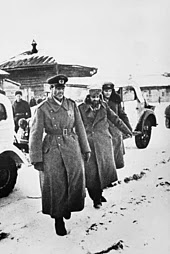Eighty years ago Paulus surrenders at Stalingrad and the Japanese abandon Guadalcanal
Defeat at Stalingrad coincided with the tenth anniversary of Hitler's accession to the Chancellorship, spuriously labelled the Machtergreifung (seizure of power). This was one of the high days of the Nazi regime but Hitler's proclamation (read over the radio by Goebbels) offered no more than a stark choice of victory or destruction. Daylight raids on Berlin by RAF Mosquitos were staged to disrupt any more formal events, but it seems none were attempted. Conscription had just been extended to all men between 16 and 65 and women between 17 and 45.
91 bombers of the US 8th Air Force mounted the first American air raid on German territory with a daylight attack on the port of Wilhelmshaven. Only three aircraft were lost; the coastal location of the target made it a relatively safe operation.
The Japanese finally abandoned their attempt to dislodge the Americans from Guadalcanal and moved to evacuate their surviving troops from the island in an operation codenamed Ke. This was not immediately obvious to American commanders, who interpreted Japanese ship movements as part of an attempt to reinforce their forces on the island. In the ensuing sea battle the USN lost the heavy cruiser Chicago and a destroyer to air attack. One Japanese destroyer was damaged, but some 10,000 soldiers were rescued in three lifts. Most were so ill and underfed tht it would be months before they were fit for combat again, but the Japanese could congratulate themselves on having avoided an abject defeat.



Comments
Post a Comment